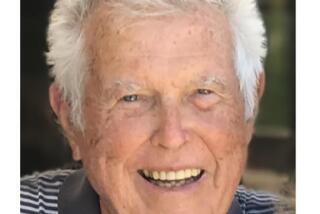OBITUARIES : Leon Shimkin; Owned Simon & Schuster
- Share via
Leon Shimkin, considered the third “S” in the publishing firm of Simon & Schuster and the visionary whose financial acumen made possible the success of the firm’s Pocket Book division, died Wednesday in New Rochelle, N.Y.
He was 81 and until recently had continued to go to his New York City office twice each week.
Shimkin, who sold the firm to Gulf & Western in 1975 after purchasing control of the company from M. Lincoln Schuster (Richard Simon had resigned in 1957), was the business end of Simon & Schuster and professed little interest in things literary.
Produced 2 Best Sellers
Yet, he produced for the company two of the best-selling and most profitable books in its history: “Your Income Tax” by J. K. Lasser and “How to Win Friends and Influence People” by Dale Carnegie. The idea for the latter book came to Shimkin after he attended a Carnegie lecture.
Shimkin had joined Simon & Schuster in 1924 as a 17-year-old, $25-a-week bookkeeper, attending school at night. He rose through the ranks in the business office and was believed the first in the book trade to sell secondary rights to books. For example, he sold the rights to the title “Inner Sanctum Mysteries” to a Hollywood studio and some of the company’s popular crossword puzzles to newspapers.
In 1939, working in conjunction with publisher Robert F. de Graff, Simon & Schuster cautiously entered the Pocket Book field. Earlier experiments in inexpensive, paperback books had failed, but Shimkin hit upon a new approach. For six months prior to the publication of the first Pocket Book, readers in and around New York were asked which existing books they would like to have available in cheaper form.
Pearl S. Buck’s “The Good Earth” was the choice, and to minimize any risk it was published for 25 cents but only in the immediate area.
The results were gratifying and for years to come, “Gertrude,” the small kangaroo holding a book in her hand and another in her pouch, became a symbol of inexpensive reading.
1 Million Copies Sold
When the Carnegie book was issued in paperback, it sold more than 1 million copies in its first several months.
About 25 million Pocket Books were shipped to troops overseas during World War II, solidifying the paperback base.
Shimkin, who had been acquiring Simon & Schuster stock during this period, was made president of Pocket Books in 1950 and eventually became an equal partner in the firm.
Years ago Bennett Cerf, in a profile in the Saturday Review of Literature, wrote, “The entire executive board of Simon & Schuster has an infallible solution for every knotty problem.
“ ‘You will have to take that up with Mr. Shimkin.’
“Mr. Shimkin loves it.”
More to Read
Sign up for our Book Club newsletter
Get the latest news, events and more from the Los Angeles Times Book Club, and help us get L.A. reading and talking.
You may occasionally receive promotional content from the Los Angeles Times.






